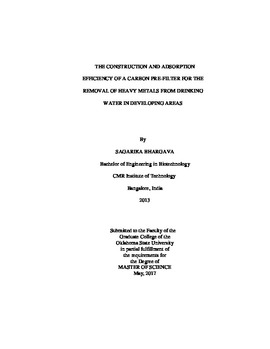| dc.contributor.advisor | Bowser, Timothy | |
| dc.contributor.author | Bhargava, Sagarika | |
| dc.date.accessioned | 2018-03-13T18:14:57Z | |
| dc.date.available | 2018-03-13T18:14:57Z | |
| dc.date.issued | 2017-05-01 | |
| dc.identifier.uri | https://hdl.handle.net/11244/54486 | |
| dc.description.abstract | Pollution is one of the leading cause of death in the developing world. Unlike natural contaminants, heavy metals do not undergo biological decay and persist in the environment. Therefore, their remediation is considered a challenge. Further research has developed new, economical and safe technologies to provide household treatment devices like the Bio-sand water Filter (BSF) to procure decentralized quality drinking water. Although the BSF is effective on bacteria, it cannot remove heavy metals. The objective of this study was to reduce mortality and illness caused by heavy metals in drinking water, specifically lead and cadmium, by focusing on field methods to efficiently produce and chemically treat coconut husk carbon without expensive equipment and use it as a pre-filter for BSF to remove heavy metals.The carbon filter material was derived from widely available coconut husk processed by heating and chemically treated using an experimental method with commercial grade muriatic acid (31.45%) which increased the uptake capacity of the carbon. The surface area of the treated carbon was determined using the Quantachrome analysis. Acid treated carbon housed in a filter body was tested to pre-filter water for the BSF. Three different concentrations of aqueous solutions of cadmium and lead were prepared to test the efficacy of the pre-filter. The final concentrations of the heavy metal ions in solution were determined using Inductively Coupled Plasma (ICP) analysis.From this study it was proved that the acid treated carbon pre-filter helps in reduction of heavy metals present in water and maintained their values in a range close to the permissible value of lead and cadmium in drinking water which is 0.05 mg/l and 0.005 mg/l respectively, recommended by World Health Organization (WHO).This water treatment method may be implemented to improve the chemical quality of water and to make safe, potable water for people living in developing areas from a less expensive raw material like coconut husk.Keywords: water, pre-filter, heavy metals, carbon | |
| dc.format | application/pdf | |
| dc.language | en_US | |
| dc.rights | Copyright is held by the author who has granted the Oklahoma State University Library the non-exclusive right to share this material in its institutional repository. Contact Digital Library Services at lib-dls@okstate.edu or 405-744-9161 for the permission policy on the use, reproduction or distribution of this material. | |
| dc.title | Construction and Adsorption Efficiency of a Carbon Pre-filter for the Removal of Heavy Metals from Drinking Water in Developing Areas | |
| dc.contributor.committeeMember | Ramanathan, Ranjith | |
| dc.contributor.committeeMember | Jadeja, Ravi | |
| osu.filename | Bhargava_okstate_0664M_15065.pdf | |
| osu.accesstype | Open Access | |
| dc.description.department | Food Science | |
| dc.type.genre | Thesis | |
| dc.type.material | text | |
